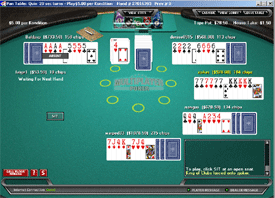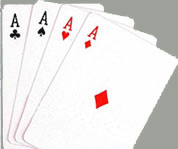 |
|
Pan, or Panguingue, is especially popular in
California and South Florida, and now, through the magic of the
internet, around the world.
The object is to be the first to meld all 10 cards in your
hand, in addition to the final card drawn.
Pan uses 8 decks with one set of spades removed and all the
8's, 9's and 10's removed, for a total of 310 cards. In
descending order, the cards rank K, Q, J, 7, 6, 5, 4, 3, 2, A.
The J and 7 are sequential.
Play goes counterclockwise.
|
 |
The
Start
 |
 After all
players post collection, the hand will be dealt. Each player that posted
will receive 10 cards. At this point they have the option of keeping
their hand and playing, or sluffing their hand and sitting out
the current hand. After all
players post collection, the hand will be dealt. Each player that posted
will receive 10 cards. At this point they have the option of keeping
their hand and playing, or sluffing their hand and sitting out
the current hand.
The
Play
 |
 Each player
in turn takes the top card of either the discard pile or the stock. A
player may take from the discard pile only if the card was drawn from
the stock by the preceding player, and can be immediately melded with
the cards in the taker's hand. When a player draws from the stock, he
must meld the card or discard it. Each player
in turn takes the top card of either the discard pile or the stock. A
player may take from the discard pile only if the card was drawn from
the stock by the preceding player, and can be immediately melded with
the cards in the taker's hand. When a player draws from the stock, he
must meld the card or discard it.
After drawing and before discarding, a player may meld as many sets
as he holds or add to his existing melds. A player must drag a drawn
card to his meld zone before any cards from his hand can be added to the
meld zone.
If a player uses a drawn card to build one or more melds, he must end
his turn by discarding a single card from his hand. This is done by
dragging the desired card from his hand to the discard pile. If he has
no remaining cards in his hand to discard and has all 11 cards in valid
melds, the hand is finished. See Going Out.
Sequence
 |

A run of any 3 or more cards of the same suit, e.g. Q J
J 7 7 .
.
Set
 |

3 or more cards of the same rank that are of only one suit, or of at
least three different suits. e.g. 4 4
4 4 4 .
Ace's and King's are an exception to this rule, which only need three of
any suit.Ace's and King's are an exception to this rule, and do not need
to be of the same suit or of three different suits, they only need three
of any suit. Once 3 cards of the same rank of the same suit or of
three different suits have been melded, any number of additional
cards of the same rank of any suit can be added to that meld. .
Ace's and King's are an exception to this rule, which only need three of
any suit.Ace's and King's are an exception to this rule, and do not need
to be of the same suit or of three different suits, they only need three
of any suit. Once 3 cards of the same rank of the same suit or of
three different suits have been melded, any number of additional
cards of the same rank of any suit can be added to that meld.
Conditions
 |
 Certain melds
are conditions. On melding a condition, a player immediately collects
chips from every other player. All 3's, 5's, and 7's are valle
(pronounced "valley") cards. The conditions are: Certain melds
are conditions. On melding a condition, a player immediately collects
chips from every other player. All 3's, 5's, and 7's are valle
(pronounced "valley") cards. The conditions are:
- A set of three same ranked but different suite valle cards
collects a chip from each player.
- A set of three valle cards of a single suit collects 2 chips, 4
chips if the suit is spades. Also, 1 additional chip is collected
for each additional valle card of the same suit added beyond the
initial three cards,2 chips if the suit is spades.
- A set of three non-valle cards of a single suit collects 1 chip, 2
chips if the suit is spades. Also, 1 additional chip is collected
for each additional non-valle card of the same suit added beyond the
initial three cards,2 chips if the suit is spades.
- A sequence starting with an Ace or ending with a King, e.g. (3, 2,
A) or (K, Q, J), collects 1 chip, 2 chips if the suit is spades.
Increasing
 |

A player may add cards to a meld if its character is preserved, i.e. he may add a
card of the same rank to a suited or unsuited set. When cards are added,
the player may collect further chips if additional conditions have been
met as described above.
Splitting
 |

A meld can be halved by adding cards if each half forms a meld. E.g.: J, 7, 6, 5 may
be halved into melds by adding Q, 4. If splitting a meld creates a
condition, payment is collected. A player can take a card from a meld to
complete a new meld, provided he leaves a valid meld. E.g.: From 7, 6,
5, 4, either the 7 or 4 may be borrowed, but not both.
Forcing
Cards
 |

If the top of the discard pile can be added to a meld of a person playing in turn, he
must take the card and meld it.
Going
Out
 |
 When a player
shows 11 cards in melds (10 cards plus his final draw card), he collects
the value of all his conditions, plus two chips from each player and
collects the tops pot. When a player
shows 11 cards in melds (10 cards plus his final draw card), he collects
the value of all his conditions, plus two chips from each player and
collects the tops pot.
Next
Hand
 |
 After the pot
has been won, all the players put in chips for the next hand. The winner
of the previous hand goes first. After the pot
has been won, all the players put in chips for the next hand. The winner
of the previous hand goes first.
Disconnection
Policy
 |

If you disconnect, you have the duration of the hand to reconnect and resume
the hand. The hand will progress even if you've been disconnected.
It is up to the player to ensure his connection is reliable. Poker-Flush helps you determine reliability by displaying the network
connection from your computer to our servers. Internet Connection
status is displayed in the lower left corner; Good, Fair, Poor, or Not
Connected. If the connection dips to Fair, either finish your hand and
reconnect, or wait for a better time to resume play.
Poker-Flush cannot be held accountable for any funds lost due to
disrupted gaming.
|
